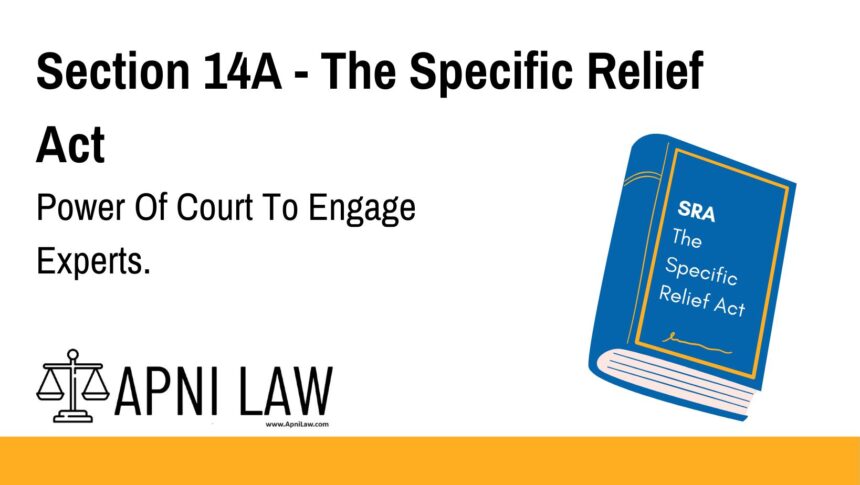Code: Section 14A of The Specific Relief Act
14A. Power of Court to Engage Experts
(1) Without prejudice to the generality of the provisions contained in the Code of Civil Procedure, 1908 (5 of 1908), in any suit under this Act, where the court considers it necessary to get expert opinion to assist it on any specific issue involved in the suit, it may engage one or more experts and direct them to report to it on such issue and may secure attendance of the expert for providing evidence, including production of documents on the issue.
(2) The court may require or direct any person to give relevant information to the expert or to produce, or to provide access to, any relevant documents, goods or other property for his inspection.
(3) The opinion or report given by the expert shall form part of the record of the suit; and the court, or with the permission of the court, any of the parties to the suit, may examine the expert personally in open court on any of the matters referred to him or mentioned in his opinion or report, or as to his opinion or report, or as to the manner in which he has made the inspection.
(4) The expert shall be entitled to such fee, cost, or expense as the court may fix, which shall be payable by the parties in such proportion, and at such time, as the court may direct.
Explanation of Section 14A:
Section 14A provides the power to courts to engage experts when the court believes it is necessary for the assistance of the case. Experts can be engaged to provide their specialized opinions on issues where the court lacks specific expertise. This section ensures that experts’ opinions become part of the official record of the case and allows their testimony in open court.
The section includes several key provisions:
- Engagement of Experts: The court can directly engage one or more experts to assist it in resolving technical or complex matters within a case.
- Access to Information: The court can direct any person to provide relevant information or produce necessary documents for the expert’s review.
- Examination of the Expert: The expert’s opinion forms part of the court’s record, and the expert can be cross-examined by the parties in court.
- Expert’s Fees: The court determines the fee that the expert is entitled to receive, and the court may also decide the proportions of cost responsibility between the parties involved in the suit.
Illustration:
Example 1: Court Engaging an Expert
A suit is filed involving a dispute over the authenticity of a document. The court decides to engage a handwriting expert to verify the signature on the document. The expert’s opinion is recorded as part of the court’s proceedings, and the expert is available to be examined in open court.
Example 2: Court Directing Access for Expert’s Inspection
In a property dispute, the court appoints a civil engineer as an expert to assess the structural integrity of a building. The court orders that the engineer be provided access to inspect the property and the relevant documents for a comprehensive evaluation.
Common Questions and Answers on Section 14A:
1. What types of issues can the court require an expert to assist with under Section 14A?
- Answer: Any specific issue in a suit where the court believes an expert’s opinion is necessary. This can range from technical matters like handwriting analysis to more complex issues like engineering or medical evaluations.
2. Can the parties in a suit request the court to engage an expert?
- Answer: Yes, the parties can request the court to engage an expert. However, it is ultimately the court’s discretion whether to engage an expert.
3. How does the court decide which expert to engage?
- Answer: The court decides based on the nature of the case and the issue requiring expertise. The expert could be a professional in fields such as medicine, engineering, handwriting, or other specialized areas.
4. What happens if the expert charges a fee?
- Answer: The court will determine the fee, and the parties in the case will pay the expert’s fees as directed by the court. The court may decide how the fees are divided among the parties.
5. Can an expert’s report be questioned or challenged?
- Answer: Yes, the expert’s report can be challenged by the parties involved in the suit. They may cross-examine the expert in open court.
Conclusion:
Section 14A of the Specific Relief Act provides an important mechanism for courts to engage experts when faced with complex or technical issues in legal disputes. This ensures that the court can make informed decisions based on specialized knowledge, ensuring justice is served effectively.








